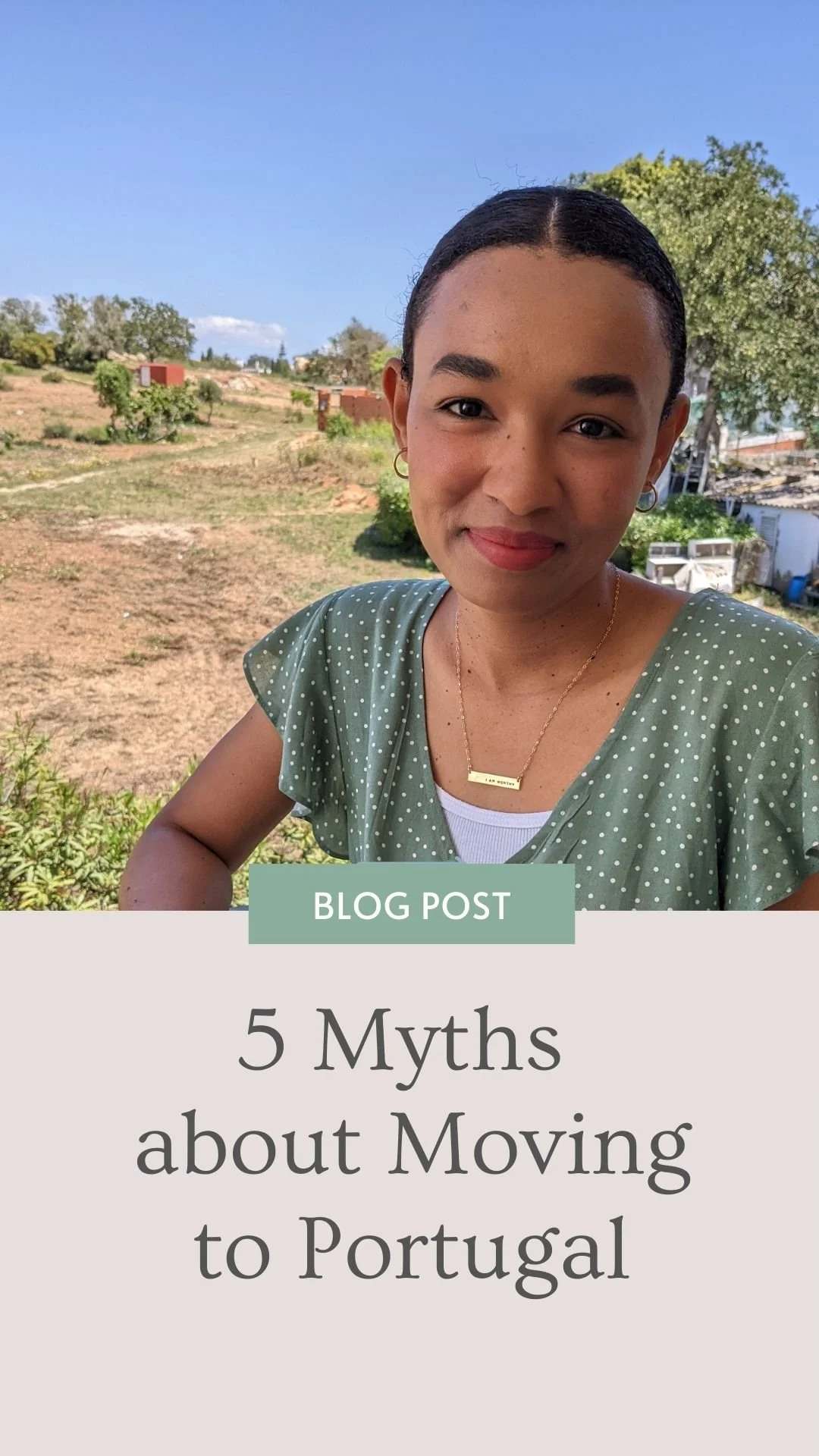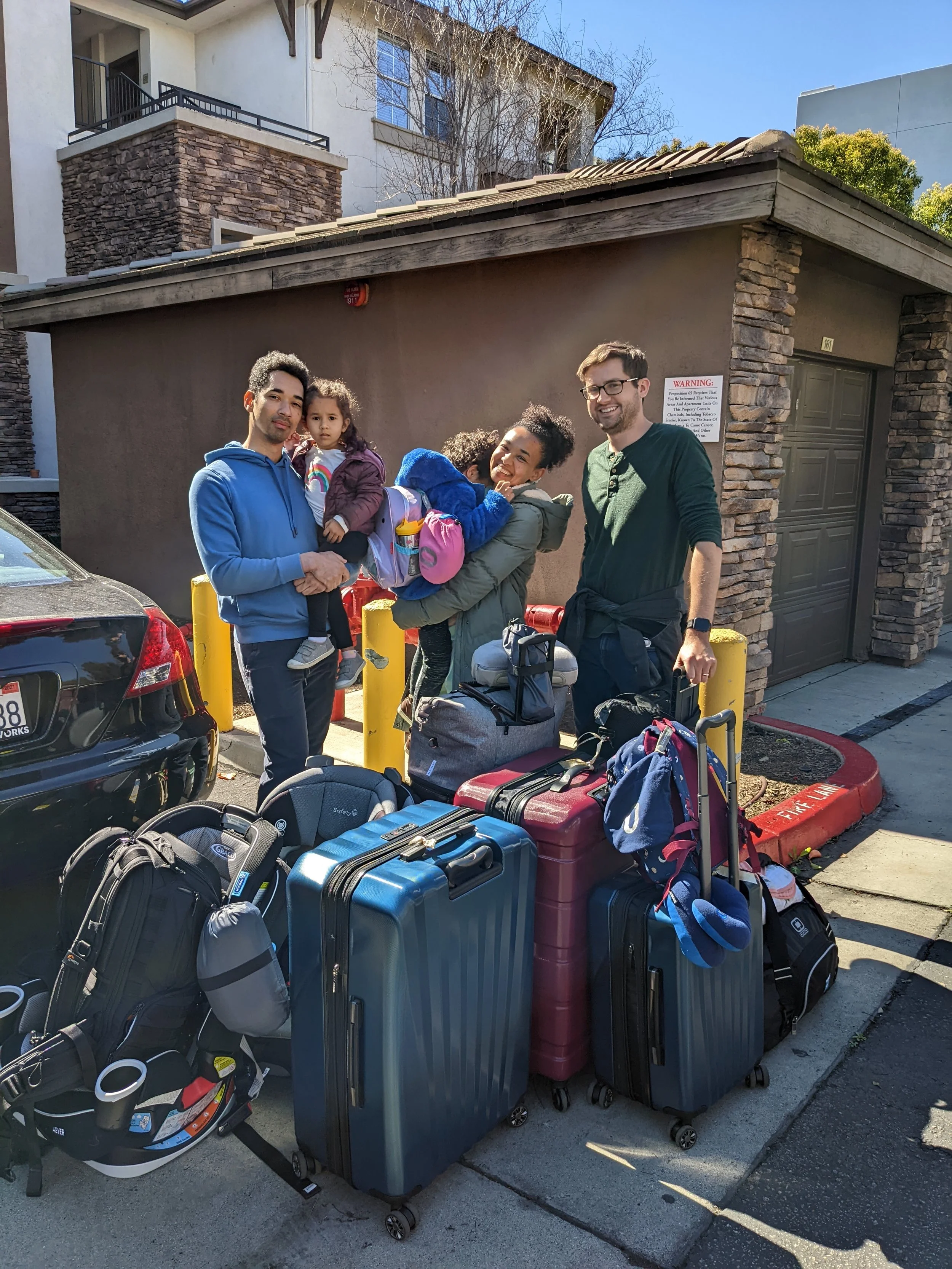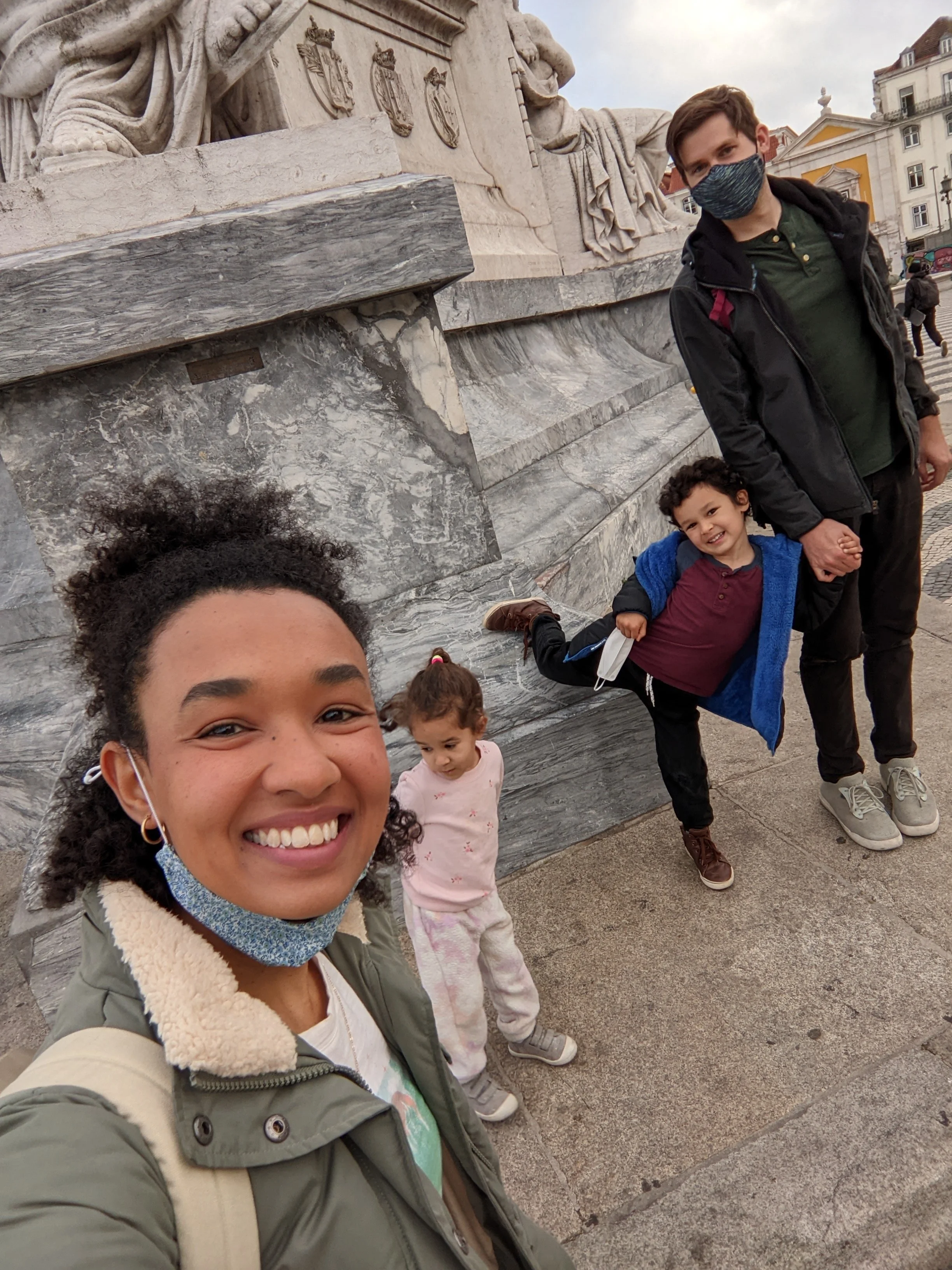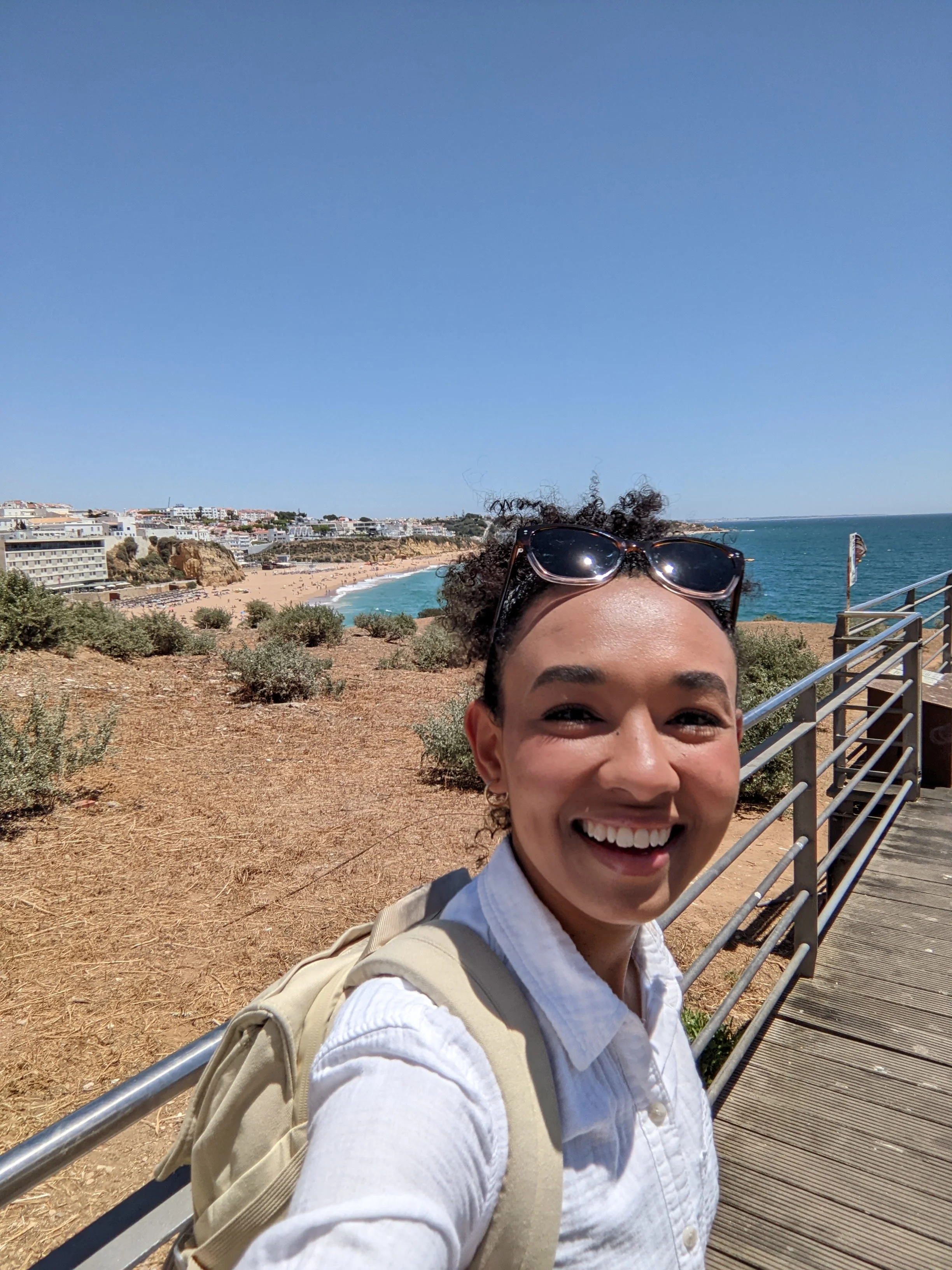5 Myths about Moving to Portugal from an American.
I’ve been getting asked about the logistical side of moving abroad. I know I had a lot of assumptions when I first started this journey of looking to move outside the U.S. Some of my assumptions almost kept me from even looking into how to make this move happen. 😣 Let this be a reminder to not tell yourself something is impossible before you’ve even done actual research!
I’m excited to debunk some of the myths about moving abroad for you! Hopefully it can encourage you to look into moving and see if it’s possible for you.
Background
If you’re new here, in March 2022, I moved to Portugal from the U.S. with my husband and two young kids. I’m sharing my experience to help people see that moving abroad is more possible than it seems!
Disclaimer
This is not legal or financial advice. All information shared is based on my personal experience. Also, the requirements of getting a D7 visa to live in Portugal could have changed since I applied for my visa in December 2021.
Myth #1: You need a work visa.
A work visa is an official government document that gives you permission to get a job in the country you want to live and work in. Not every country requires a work visa in order to live there. There are different kinds of visas that require different things.
In my case with moving to Portugal, I applied for a D7 visa, which gives you permission to live in Portugal as long as you have proof of monthly income or enough savings to sustain yourself and your family members for up to one year.
If you have a remote job that can pay for the living expenses of you and your family for each month, or if you have savings that can pay for your living expenses for up to one year (according to Portugal minimum wage, which is lower than in the U.S.), this meets one of the biggest requirements of getting a D7 visa.
The amount of money you earn per month or have saved for one year needs to be equal to or greater than the Portugal minimum wage.
For example, if your family has two adults and two children, you would need a minimum of $2,700 per month in income or $32,400 in savings for one year. This of course is the bare minimum, and does not include the cost of school tuition fees or private health insurance.
At the Arco da Rua Augusta in Lisbon, Portugal.
Myth #2: It’s really expensive.
When it comes to moving countries, taking all of your stuff with you can get expensive. Some people pay for a moving company that takes all their stuff to the country they’re moving to in a shipping container. Other people pay for storage. At the end of the day, how much stuff you want to move is up to you.
My husband and I made the decision that we would only take to Portugal what we could carry. We sold as much of our things as possible and gave away the rest. We also lived in a 2-bedroom apartment and have a pretty minimalist approach to life, so keep in mind that we didn’t have a ton of stuff to begin with. When it was time to get on the plane, we had 2 large suitcases, 2 small carry-on suitcases, 4 backpacks, 3 small duffel bags, and 2 carseats.
In terms of other upfront costs, here’s the breakdown:
Short-Term Rental: I was required to pay for an Airbnb, which cost $1,400 for one month.
Plane Tickets: I had to buy plane tickets that went to Portugal and back to the U.S., which cost roughly $3,000.
Legal Documents: There were also costs associated with getting legal documents like birth certificates, marriage certificate, passports, FBI background check documents, and then getting some of those documents translated into Portuguese and having them “apostilled,” which basically means getting a piece of paper from the Secretary of State that verifies that your documents are real. All of this cost roughly $300.
Application Fees: It cost about $95 per application. You don’t need to submit applications for your kids. You only need applications for yourself and your partner / spouse if you have one.
Traveling to the Portuguese Embassy in the U.S.: Portugal has two embassies in the U.S. — one in San Francisco and one in Washington, D.C. The Portuguese government has recently created a new requirement for D7 visa applicants where you have to travel to one of their embassies to apply in person. I lived in southern California, so this cost me around $1,000 for flights, hotel, transportation, and food to go to the Portuguese embassy in San Francisco.
It’s true that there are a good number of upfront costs, but they can be spread out over time. Applying for a visa can take months, and even up to one year. You can decide how fast or slow you want to put together your application. Of course, you can’t speed up how long the government takes to give you your documents or review your application(s), but if you don’t have all the money you need up front, you can spread out the steps. Just keep in mind that the requirements for the visa you’re applying for can change, so it’s important to keep checking the Portuguese embassy website for updates.
For my husband and I, we knew that once we were in Portugal our monthly living expenses would be 50% less than they were in California. So, we saw the upfront costs as a worthwhile investment because staying in southern California was becoming more and more difficult financially.
Our last morning in California. That’s all our stuff!
Myth #3: You have to know the native language before you move.
Of course it’s ideal to know the native language of the country you’re moving to, but do some research before thinking you MUST know the native language in order to live there. In Portugal, for example, many people speak English, especially in the major cities of Lisbon, Lagos, Faro, and Porto (to name a few). English is a widely spoken language around the world, so people are taught English in schools from a young age in order to have more work opportunities.
All it takes is a little research to figure out what country and what areas would be best for you as you transition into living in a new country and learning the native language. Practicing Portuguese was a great way for me and my husband to stay connected to our goal of moving to Portugal during the long (and sometimes frustrating) visa application process. It can take months to get your application submitted and approved, so using that time to start learning the language, minimize the things in your home, and prep your finances to be ready for your big move are all great ways to stay motivated and keep moving toward your goal.
Exploring historical sites in Lisbon, Portugal.
Myth #4: Finding community is hard.
I couldn’t disagree more with this myth. I’ve actually found it really easy to meet people in Portugal and to make community.
Since coming here, I have attended mom get-togethers, I’ve been to a birthday party, and I’ve made friends with people who were also hanging out at the beach with their kids. Depending on the country you go to, there are actually a lot of American immigrants in different countries around the world, and Portugal is no exception. There is a large American population here in Portugal, and it’s really easy to strike up a conversation and keep it real because other Americans left the U.S. for the same reasons I did. I’ve also found it really easy to talk to Brazilian immigrants in Portugal because they understand what it’s like to leave their home country.
Go to the beach, go to playgrounds, work at cafes and co-working places, use the MeetUp app to find gatherings and events near you, search Facebook groups that match your interests (there are so many of them!). You’re bound to find something and someone to connect with.
One final note on building community: I actually find it easier to build community in Portugal than I did in California because there isn’t a 24/7 work culture here. People have TIME to connect. It’s not a constant schedule-and-cancel gatherings culture, which I experienced a lot of in the U.S.
Recently, I went to a gathering of expat moms who run their own businesses, and there were moms from all over the world, sitting in a living room, eating cheese and drinking wine, sharing our common struggles of being mothers while running our businesses. It was so awesome, and it completely took away any fear I had of making friends in this new country.
Taking in the sites in gorgeous Albufeira, Portugal.
Myth #5: The decision to move is permanent.
I know this one sounds silly because nothing in life is permanent, but as humans we tend to think in all-or-nothing, black-and-white thinking.
I remember contemplating moving to Portugal over a year ago. I’ve wanted to live in Europe for at least a year since I was 9 years old. Needless to say, my life didn’t go as planned, and I thought that ship had sailed — at least until my kids become adults. I was also nervous about moving my whole family to a foreign country. What if I didn’t like traveling around with young kids? What if I wished I never moved in the first place?
The therapist I was seeing at the time reminded me of something extremely important: California would still be there if I wanted to come back.
This made me zoom out and recognize that one year of my life is just one year of (hopefully) many years! And if I didn’t like living in Europe, it would be a temporary experience that would be such a life-changing learning experience, even if I didn’t like it that much.
I was ready for a change in my life, and I was ready to start saying “yes” to some of the dreams I put on hold when I became a mother and entered the American rat race of rising, grinding, and paying bills.
I hope seeing me move countries with two young kids can help encourage you to start saying “yes” to the things you want in life because life is so short, none of your decisions need to be all-or-nothing, and there is so much to experience and enjoy in the world if you take a chance and step outside of your comfort zone!
Learn the stuff Portugal influencers are not talking about in my new eBook: 25 Things You Should Know Before Moving to Portugal!
This 38-page eBook covers:
Food
Healthcare
Housing / Apartments
Language
Lifestyle
Money
Parents
Safety
Transportation
Weather
Renting an Apartment Checklist
Staying in an Airbnb Checklist






